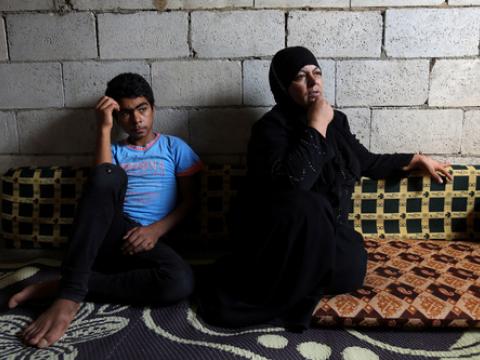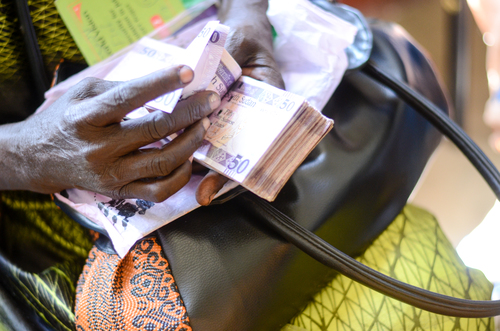Improving the customer service experience for children and communities

By Kathryn Taetzsch, Global Director, Humanitarian Partnerships & Cash Based Programming, World Vision International
A customer care hotline
You’re entitled to receive a service. You don’t. You call the customer care hotline you were helpfully provided with. How are you feeling at this stage? Angry? Let down? Frustrated? You’ve called the hotline, and you’re put on hold. You finally reach a human and explain your issue. They appear to listen to you, assure you that your case will be followed up, action will be taken.
And then…nothing …weeks, months later, still no response, no indication what has happened to your complaint and you have given up waiting…
Now imagine that the service you have not received is your lifeline. Like it has been for 8-year-old Wahid, who fled the war in Syria with his mother and five siblings. For more than six years, they have been living in a semi-finished building. He and his mother suffer from asthma and other respiratory issues, which they cannot afford to buy medicine or access health care. World Vision distributes multipurpose cash transfers to Wahid’s family and others, meaning they are able to prioritise their critical and ongoing supply of medicine. It is cash transfers like this, which enable them to decide which priority needs they will meet, that mean Wahid’s family can get through each day.
Imagine this is the service you cannot access, when your children are sick. And you are being told to wait. You do not know why, nor does it appear anyone knows enough to inform you about other steps you could take.
This is not good enough. World Vision believes there is a better way. And we are working with decision makers, in the Grand Bargain Cash and Participation Revolution, to make change happen. We want to promote a culture of transparency, accountability and learning so that no one has to experience this despair and frustration.
Building customer satisfaction
How do we do this? By building trust. In World Vision, the views of children and communities are central to our approach. Being people-centred means providing information to children and communities about us as the organisation providing assistance, about who will be receiving assistance, the type of assistance they are entitled to receive, and the reasons why. And we gather feedback from those who receive and those who don’t.
Feedback like this means that people affected by disasters have a channel to provide a unique and important perspective on the relevance and quality of services, the adequacy of engagement, their trust in other, and their sense of empowerment.
This feedback and information exchange is not only about sharing, it’s about learning and adapting. It’s about informing our competencies, capacities and commitments as an organisation. And it’s not just adults. Children’s feedback is essential when designing and adjusting cash-based programmes that address basic as well as specific needs during and post disaster contexts. Their experiences and perspectives are unique to them, and giving them space to be heard means giving them dignity, strengthening their self-perception, and helping to build positive coping strategies. It takes listening to communities and children themselves to end violence against children.
It takes a lot of effort to effectively give feedback that is read and heard, analysed, referred and – most importantly – acted upon.
Over our many years of implementing cash programme interventions in very different contexts, cultures and through a variety of ways, we have developed, mainstreamed and implemented systems like the above to improve our listening and accountability to the children and communities we work with.
We are part of a movement within the wider humanitarian industry to improve both the services we provide and the way in which we provide them. World Vision believes the Inter Agency Standing Committee (IASC) Accountability to Affected People (AAP) commitments will ensure substantial change, by including the valued contributions of those most at a disadvantage after an emergency. Those whose voices and input often goes unsought or unheard.
Hearing feedback and adapting
Seeking and obtaining feedback may be time consuming and challenging, but keeping up with that feedback poses a whole new set of issues. And these issues can be turned on their head, as we have seen in World Vision, when you introduce cash-based programming, and strong ways for people to give feedback. It changes the dynamic between those who make decisions about who gets what, how much and why, and those who receive. It gives them the liberty to decide and to invest the amounts received where they deem most necessary and appropriate for themselves.
This is even more effective if and where humanitarian accountability mechanisms are well established, promoted and effectively functioning. In times of extreme stress and crisis, when families are coping with new ways of living, getting the small things right is the difference between someone understanding a system, and cutting up a cash card to share with their family. Strong feedback approaches mean people can ask for clarification on entitlements and ways they will receive them. They give them ways to report harassment and abuse, and express their appreciation about the assistance or provide suggestions on how this assistance should be provided in a better way.
Quality customer care is the critical component of any provision of goods and services, even and especially when those goods and services are life saving. Customer service for families like Wahid’s must go beyond lip service.
